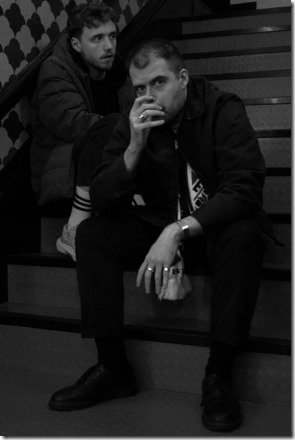Leeds based militant dance-punk duo Polevaulter dropped their debut album ‘Hang Wave’ on Friday to widespread acclaim.
If you haven’t heard it yet, it’s a superb sonic assault of seismically sharp bass and loin-grinding beats, and we wrote about it at length recently.
Now following the album release and ahead of their UK / EU tour starting this week, Polevaulter have unveiled a brand-new video for the album’s latest single ‘Pissed In The Baths’, which you can watch here:
The sonic assault the two create is almost arrogant, fathered from the marriage of seismically sharp bass and loin-grinding beats. The words are quipped and brayed atop the aural landscape. They are boastful, accusing, repellent and inviting, they question and skewer the veins of masculinity, sexuality, the order of things, the music industry and the miserable reality of the North. Polevaulter have toured with JOHN, shared a stage with Thank, Mandy Indiana, Pink Turns Blue, Bambara, A Place To Bury Strangers, VR Sex, and others.
Now, following the album release and ahead of their UK / EU tour starting this week, Polevaulter have unveiled a brand new video for the album’s latest single ‘Pissed In The Baths’.
On writing the track, Polevaulter’s Jon Franz explains; “Pissed In The Baths came about from Dan’s chorus riff which he just pulled out of thin air, we made the verses more straight and got it to swing with my delay. I wrote the lyrics pretty quickly on a bus to the doctors, lyrically it’s about manifesting strength and about us setting sail, I tied the chorus into it as those lines came from a while ago about warming oceans and rising sea levels, it all got glued together.”
The result is a cacophonous injection of climate change activism, brimming with hypnotic beats and thick fuzzy bass and glossed in a coat of sharp unnerving darkness. Chaotic and smashing you in the face with its tidal wave of full-on noise and addictive shouted refrains, Polevaulter are not holding any punches with ‘Pissed In The Baths’ as they continue on their bulldozer-like mission to tear up boundaries.
Debut Polevaulter album ‘Hang Wave’, is a hard-hitting dark and fiercely off-kilter slab of awesome sickly noise alongside baritone-led lyricism acerbic, vitriolic and intense throughout, raising eyebrows and dropping jaws. The album features recent hits like ‘Trend’ and newly released single ‘Violently Ill’ which Polevaulter’s Jon Franz explains- “has more sparse vocals than most of our tracks, gives our music a chance to shine. Its maybe my favourite song on the album.” Other tracks like ‘Pissed In The Baths’, ‘Mint Condition’ and ‘Mia Goth Made Me Do It’ all stand out in what is essentially an absolute mind melting juggernaut of a punk electro dance record for 2024, which lays down the gauntlet from a studio perspective alongside Polevaulter’s diligent process to earnestly take the title of ‘hardest working band in showbusiness’.
Polevaulter weren’t always a duo though as Jon Franz recalls, “We were steaming along as a post-punk band with various noise elements and then lost some members over covid, but me and Dan wanted to keep going. We thought about starting a new band, but we felt that this still had legs. Ultimately, it’s not that different, me and Dan did most of the composition, and we’ve got a clear vision on what we want to do. After touring last year as a two-piece, figuring out whether we could even do it, we realised there’s definitely no reason to stop – and it’s definitely getting better every time we have a round of gigs. I like not carrying instruments around – that’s quite nice. Although, having said that, we’re a duo now and we have more amps, which is weird. Dan has three amps now, and I have two.”
The album was co-produced by longtime friend and artist Shaene Hunter which straddles confidently atop several themes, to which Jon Franz says, “This being our first album or our maiden voyage, I dunno why, but I like a lot of nautical terminology and see that kind of visual imagery when this album was being made. I also write a lot of lyrics about things that directly affect me, like my masculinity, my mind, about being tough and overly arrogant to sell the image of us we’ve created. We have a lot of reference points that I work in, and since we’ve become a two piece, I think there is a lot more depth to everything we do now. We’ve made ‘Hang Wave’ because it’s about time we made this kind of a statement about who we are, what we want to do and what we sound like after multiple line-up changes and situations slowed the progress me and Dan were desperate to make. Since we’ve been a two piece, we’ve got far more done, and we both feel really proud of this album, and we feel strongly that it will do what we need it to do.”
Polevaulter recently performed their debut album on repeat for 8 hours straight via a livestream to raise funds for the Gaza Sunbirds, a para cycling team based in the Gaza Strip. The team is currently providing emergency food parcels and aid to families sheltering around the Gaza Strip. Watch the livestream back here:
– And to donate visit: https://www.justgiving.com/page/polevaulterforgazasunbirds
Polevaulter will tour the UK and EU as follows:
Jan 31st – The Fenton, Leeds – Album launch
Feb 2nd – Hatch, Sheffield
Feb 3rd – Little Buildings, Newcastle
Feb 6th – New Adelphi, Hull
Feb 7th – The Lounge, Manchester
Feb 8th – Old Blue Last, London
Feb 9th – Bear Cave, Bournemouth w/ JOHN
Feb 10th – Craufurd Arms, Milton Keynes w/ JOHN
Feb 13th – DAda, Toulouse, France
Feb 14th – TBA, France
Feb 15th – Le Lezard, France
Feb 16th – Melody Maker, Rennes, France
AA










